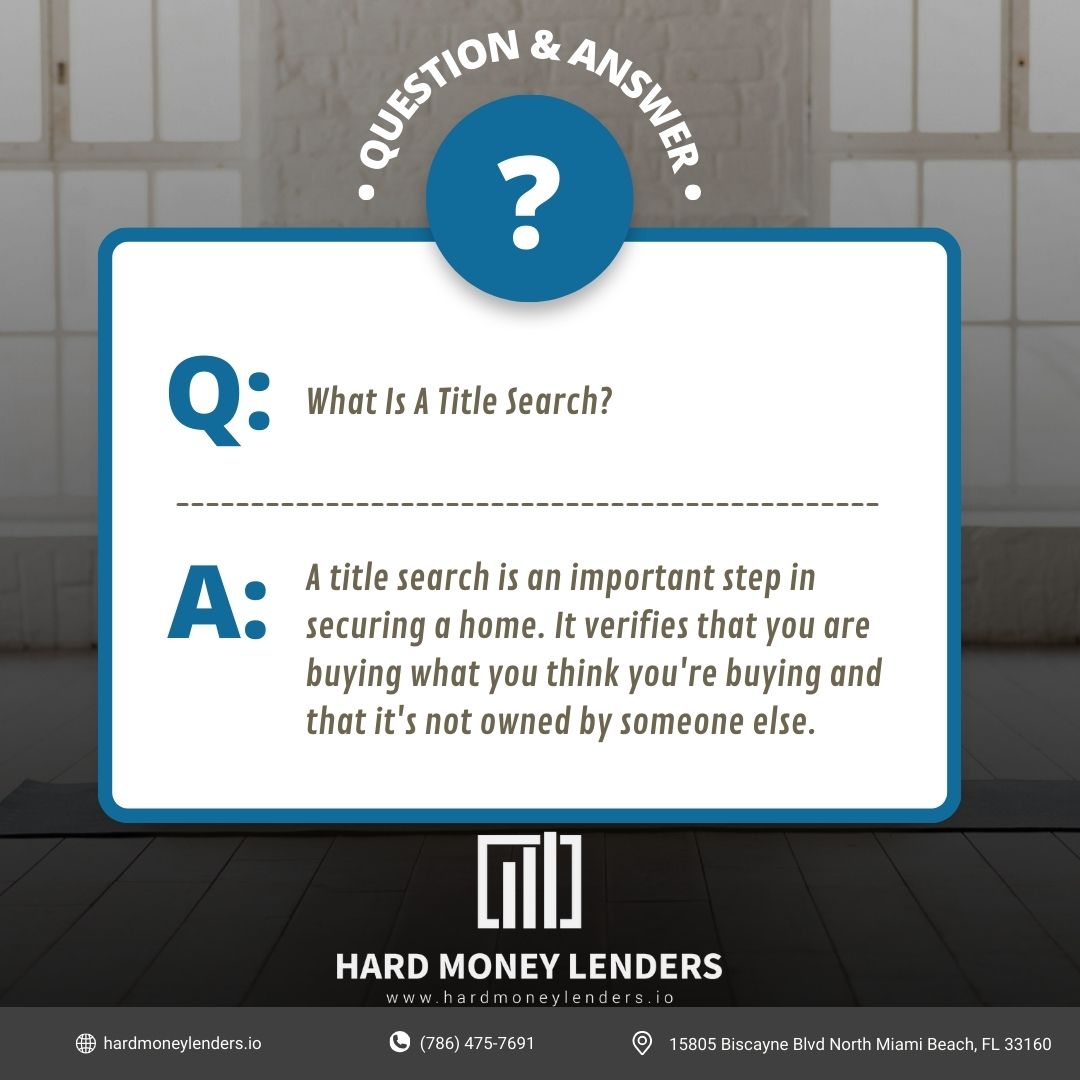Last Updated on June 14, 2024
Buying a home is one of the most important financial decisions you will make in your lifetime. It can be an exciting and life-changing experience. Also, a decision that requires careful consideration. That’s why it’s important to understand everything there is to know about purchasing a home, including what goes into a title search and how it can protect you from potential disasters. That said, before you go out and purchase a home, make sure to read our guide on property title search & title insurance.
What Is A Title Search?
A title search is an important step in securing a home. It verifies that you are buying what you think you’re buying and that it’s not owned by someone else. It also ensures there aren’t any liens or encumbrances on the property, like unpaid taxes. A title search can help ensure you don’t buy a property with hidden issues like these, which could make it harder to resell when it’s time to move on.
What Will The Title Search Reveal?
A title search will tell you the status of the property in question, including any liens or encumbrances that exist against the home and whether any existing claims or lawsuits are pending. Also, it will show if there are any zoning violations that may affect your title in some way (like an unresolved violation from when the house was constructed).
What are the types of errors that could be found during a title search?
Chain of title
An error in the order of ownership stemming from a misrecorded deed. For example, if a piece of land was purchased by Jane Doe, who then sold to John Smith and then died without having her will recorded with the county clerk’s office, it could be difficult for anyone else to obtain the property because there is no legally documented way for them to verify that Jane sold the land before she passed away.
Land Description
Errors in the land description can occur when someone buys or sells real estate without knowing its exact location. In this case, if you purchased one square mile of land thinking it was another square mile owned by someone else and they wanted their own back again (or vice versa), neither party would know where exactly they were looking for their respective piece(s) of property.
Recording
Error in recording can also lead to problems down the road if not corrected immediately after purchase. If your deed doesn’t reflect all necessary information—such as an incorrect address or inaccurate description—you may find yourself unable to access vital documents later on when needed most.
What happens if there’s a problem with the title?
If there are problems with your title, they will be revealed during your title search. You’ll want to review these findings carefully before moving forward with your purchase. Problems with the title could result in delays or even complete cancellation of your closing date if it’s determined that the seller cannot transfer a clear title to you. This can also result in additional fees being tacked onto your closing costs, which could put an unnecessary strain on your finances at a time when you should be focusing on preparing for homeownership instead of worrying about added expenses.
But don’t let the problems with the title discourage you. For instance, if you find a property with delinquent taxes, you can read Buying a Property with Delinquent Taxes to learn how to get this problem fixed!
How often should I get a title search done?
Because the value of your home is directly related to its title, it’s important to have a thorough and current title search done at least once a year. You can also opt for more frequent reports if you’re concerned about activity on your street or in your neighborhood. If you live in an area where many foreclosures or other distressed properties are being auctioned off by banks or other lenders, it may be wise to get your title checked every six months instead of annually.
Can I check my home’s title on my own?
Doing some research on the history of the property is important, but searching for your own title can be risky. It requires a thorough understanding of the law, and extensive knowledge of real estate transactions to interpret the results accurately. The information contained in a deed or other recorded documents may be confusing and difficult to interpret without professional help. In addition, there may be documents that were never recorded with your county’s deed office but are still part of your property’s history. So even though the answer is “yes”, it’s highly recommended to have a professional do it.
How do I choose a title company?
When choosing a title company, you should look for one that is licensed in your state and has a good reputation in the community. A title company should be well-respected by realtors and other members of the industry.
When you’re looking at competing quotes from different title companies, make sure you’re comparing apples to apples:
- Are they all using comparable price points?
- Do they offer similar services?
- Look closely at how much each service costs, such as
- conducting an abstract search ($50-$75)
- preparing an owner’s policy (between $250-$500)
- issuing a duplicate original certificate ($25-$50)
- producing a land record copy ($10-$20).
These fees will vary depending on how busy your local county office is. So to save you time and money, it’s important to talk with several agents before deciding on one. First American Title offers a title quote calculator to get a free estimate.
What Is Title Insurance?
In contrast to title searching, which entails checking the public records for any issues or liens that may affect your ability to transfer property ownership, title insurance protects the buyer, seller, and lender against potential losses associated with undisclosed matters affecting your land’s deed.
How Title Insurance Protects Against Fraud
Title insurance is a critical safeguard against various types of real estate fraud, protecting homeowners and lenders from financial losses due to fraudulent claims or transactions. One of the primary protections it offers is against forgery and fraudulent deeds. Title insurance ensures that if someone illegally claims ownership of a property using forged documents, the homeowner is protected. This protection is crucial as such fraudulent activities can occur years after the initial purchase.
Additionally, title insurance covers scenarios involving unknown heirs. In some cases, a property might be sold without the knowledge or consent of all rightful heirs. If these heirs come forward later to assert their ownership rights, title insurance covers the legal costs to defend against these claims, ensuring the homeowner’s rights are protected.
Moreover, title insurance addresses issues arising from improperly executed documents. Mistakes during the execution of documents, such as improper notarization or incorrect legal descriptions, can lead to disputes over property ownership. Title insurance guarantees that these issues are resolved without financial loss to the homeowner, ensuring a smooth and secure ownership experience.
By covering these potential risks, title insurance provides peace of mind, ensuring that homeowners and lenders are protected from unforeseen legal complications and financial burdens related to real estate fraud.
Choosing the Right Title Company: Tips and Recommendations
Choosing the right title company is essential for ensuring a smooth and secure home-buying process. Here are tips and recommendations for making the best choice:
- Research and Reviews: Start by researching title companies online and reading reviews from other homebuyers. Look for companies with consistently high ratings and positive feedback regarding their professionalism, efficiency, and customer service.
- Ask for Recommendations: Seek recommendations from your real estate agent, mortgage lender, or friends and family who have recently purchased homes. Personal referrals can provide insights into the reliability and quality of service.
- Verify Credentials: Ensure the title company is licensed and in good standing with state regulatory agencies. Check for any past disciplinary actions or complaints against the company.
- Compare Services: Not all title companies offer the same range of services. Some may provide additional services such as escrow handling, document preparation, and closing coordination. Compare these services and choose a company that meets your specific needs.
- Interview Potential Companies: Contact multiple title companies to ask about their experience, services, and fees. Questions to ask include:
- What is your experience with properties in this area?
- Can you provide references from recent clients?
- What are your fees for title search and title insurance?
- How do you handle potential title issues that arise during the process?
- Red Flags to Watch For
- Lack of Communication: If a title company is slow to respond or fails to provide clear answers to your questions, it may indicate poor customer service.
- Hidden Fees: Be wary of companies that do not provide a transparent fee structure or have numerous hidden charges.
- Inadequate Experience: Ensure the company has sufficient experience handling transactions similar to yours, especially if your property has unique or complicated aspects.
Where To Buy Title Insurance?
If you want to be sure that you are buying a home with a clear title and not one that is encumbered by any claims or liens, then it’s best to purchase a title insurance policy from an independent agency. In addition, if the seller will not agree to obtain title insurance for their protection, it is usually possible for the buyer to obtain a separate policy.
There are four main types of service providers who can provide title insurance: real estate agents, attorneys, escrow companies, and traditional title companies (also called abstractors). The first three may provide either full-service or limited-scope services (depending on where they operate). Traditional companies typically offer full-service policies only.
What are the different types of title insurance?
Lender’s Title Insurance
Lender’s title insurance protects lenders against losses that may result if a loan is not repaid as scheduled or if it turns out that the property has a defect that makes it impossible to sell or refinance the loan. When you apply for a mortgage, your lender will require you to obtain a lender’s title insurance on any real estate you purchase with the loan.
Owner’s Title Insurance
Owner’s title insurance protects an owner from loss resulting from errors or omissions in recorded documents affecting their ownership rights. For example, if you purchase real estate from a seller who doesn’t have a clear title to it, you may face problems when trying to sell or refinance your ownership interest. This type of policy also protects against losses that may result from environmental hazards on or near your property.
Examples of problems that could occur would be…
Incorrect recording of documents affecting title
If a person files an affidavit claiming ownership of your home and has it recorded in error, that could cause problems with your ability to sell or refinance your home.
Fraudulent transfer
This refers to any unlawful transfer made without legal authority, such as
- Sales made by creditors after foreclosure proceedings have been filed against you.
- Deeds given by minors who cannot legally own property.
- Deeds given by mentally incompetent people who don’t know what they are doing.
- Conveyance of land taken illegally from its rightful owner.
- Use of forged documents for transfer purposes.
- Use of unauthorized signatures on any document affecting title.
Unauthorized liens or encumbrances
If someone places a lien on your home without permission (for example, if they fail to pay off their auto loan at the bank), then this action could affect your ability to sell or refinance your home.
Title insurance and title search both go hand-in-hand.
When you purchase a home, the lender requires that you buy title insurance as part of the closing costs because it protects against losses that may occur due to defects in the title.
A title search is prepared by an attorney on behalf of your lender. It’s their responsibility to ensure that there are no property liens or other issues affecting your ability to take ownership of your new property before agreeing to lend money for its purchase.
The report from this search will contain information about any outstanding mortgages, easements or restrictions on the land, recordation of deeds, and other pertinent documentation related to previous ownerships over time (including liens).
Wrapping Up Title Search & Title Insurance
If you are nervous, you are not alone. There are many potential pitfalls awaiting the unwary home purchaser. However, a title search and title insurance guide can help to ensure your peace of mind during this exciting period in your life. We hope that this article has been a helpful introduction to the world of title searches. Remember you can always count on experts like us when you have any questions. With some information and practice, obtaining a title search and getting title insurance will be as easy as riding a bicycle—well almost!
FAQs
How long does a title search typically take?
A title search usually takes between a few days to a couple of weeks. The timeline depends on several factors. The complexity of the property’s history is a significant determinant. For properties with a straightforward history and minimal previous ownership, the search might be quick. Conversely, properties with extensive histories, multiple owners, or legal complications can take longer. The efficiency of the title company also plays a crucial role. Some companies have more streamlined processes and better access to public records, allowing them to complete searches faster. Additionally, local government offices’ responsiveness in providing necessary records can impact the timeline. In areas with high transaction volumes or slower bureaucratic processes, expect longer search times.
What happens if an issue is found during the title search?
If an issue is discovered during the title search, it must be resolved before the transaction can proceed. Common issues include liens, such as unpaid taxes or outstanding mortgages, which need to be cleared. Ownership disputes can also arise, requiring legal intervention to establish rightful ownership. Documentation errors, such as incorrect property descriptions or improperly recorded deeds, must be corrected to ensure a clear title. Resolving these issues may involve negotiations between the buyer and seller, legal action, or financial settlements. In some cases, the seller might need to pay off debts or resolve disputes to provide a clear title, which can delay the closing process .
Can I negotiate who pays for title insurance?
Yes, it is possible to negotiate who pays for title insurance. This aspect is typically addressed during the purchase agreement negotiations. In many regions, it’s customary for the seller to pay for the owner’s title insurance policy, while the buyer covers the lender’s policy. However, these customs can vary significantly by location and market conditions. In competitive markets, buyers might agree to cover more costs to make their offer more attractive. Conversely, in a buyer’s market, sellers might agree to pay for both policies to facilitate the sale. It’s essential to discuss and agree on these costs early in the negotiation process to avoid misunderstandings later on.
What is an escrow account and how does it relate to title insurance?
An escrow account is a neutral third-party account used to hold funds from both the buyer and seller until all terms of the sale are met. The escrow company, which manages this account, ensures that all conditions outlined in the purchase agreement are satisfied before releasing the funds. This includes verifying that the title is clear and that any required repairs or inspections have been completed. The escrow company often works closely with the title company to confirm that all title-related conditions are fulfilled, ensuring that the property can be legally transferred without issues. By holding the funds in escrow, both parties are protected against the risk of non-compliance with the sale terms, providing an additional layer of security in the transaction .
Can title insurance protect against boundary disputes?
Yes, title insurance can protect against boundary disputes. These disputes typically arise when there are discrepancies in property lines that were not properly recorded or when errors were made in the documentation. For instance, if a neighbor claims that part of your property encroaches on theirs due to an incorrect survey or poorly defined property lines, title insurance can cover the legal costs associated with defending against these claims. It can also compensate you for any loss of property value if the dispute results in a reduction of your property size. This protection ensures that homeowners are not financially burdened by issues stemming from inaccurate or unclear boundary descriptions in public records .
How does title insurance differ for commercial properties?
Title insurance for commercial properties often involves more extensive coverage due to the higher value and complexity of these real estate transactions. Commercial properties may face unique risks not typically associated with residential properties, such as zoning law violations, environmental issues, or undisclosed easements. Therefore, commercial title insurance policies are usually customized to cover these additional risks. This can include extended coverage for issues like leasehold interests, violations of building codes, and unrecorded liens. Because of the substantial financial stakes involved in commercial real estate, the due diligence process is more rigorous, and the policies are designed to provide comprehensive protection for large-scale investments .
Is title insurance required for refinancing a mortgage?
Lenders typically require title insurance when refinancing a mortgage to protect their investment, even if you already have an existing policy. When you refinance, a new loan is created, and the lender will want to ensure that there are no new claims or defects on the title that could affect their security interest in the property. This new policy, known as a lender’s title insurance policy, safeguards the lender against any title issues that could arise after the refinance. While the borrower is generally not required to purchase a new owner’s policy, having one can provide ongoing protection against any title defects that may have been missed during the initial purchase .
Can title insurance be transferred to a new owner?
No, title insurance cannot be transferred to a new owner. When a property changes ownership, the new owner must purchase a new title insurance policy to protect their interests. The existing title insurance policy only covers the current owner and their lender, safeguarding them against any title issues that arose during their ownership. This requirement ensures that each owner has an independent assurance of clear title, free from any encumbrances or defects that might not have been covered or disclosed in previous transactions.
What is the difference between a title search and a property survey?
A title search and a property survey serve different purposes in real estate transactions:
- Title Search: This process examines the legal history of ownership and any encumbrances, such as liens or easements, associated with the property. It involves a thorough review of public records to ensure that the property’s title is clear and can be legally transferred to the new owner. The title search uncovers any potential legal issues that could affect ownership.
- Property Survey: A property survey measures the land and identifies its boundaries and physical features. Surveyors use precise tools to map the property’s dimensions, including structures, fences, and any other physical characteristics. This helps verify the property’s exact boundaries, ensuring that there are no disputes with neighboring properties over the land’s extent.
How are title defects resolved?
Title defects are resolved through various methods depending on the nature of the issue:
- Clearing Liens: Any outstanding liens on the property, such as unpaid taxes or mortgages, must be paid off and released. This often requires negotiating with lienholders and providing proof of payment.
- Correcting Public Records: Errors in public records, such as misspelled names or incorrect legal descriptions, need to be corrected. This may involve filing corrected documents with the appropriate government offices.
- Settling Ownership Disputes: If there are disputes over ownership, these must be resolved before the property can be sold. This could involve reaching agreements with claimants or taking legal action to quiet the title.
- Legal Action: For more complex issues, such as fraudulent claims or unresolved disputes, legal proceedings may be necessary to clear the title. This ensures that the new owner receives a clean and marketable title.
What is the role of a title examiner?
A title examiner plays a crucial role in the real estate transaction process by:
- Reviewing Public Records: Title examiners meticulously review public records to uncover any issues that could affect the title. This includes looking for liens, easements, encumbrances, and any other claims against the property.
- Identifying Title Issues: They identify and document any defects or issues that might affect the property’s title, such as unresolved ownership claims, incorrect legal descriptions, or undisclosed liens.
- Ensuring Clear Title: Their goal is to ensure that the title is free of defects, allowing the property to be transferred without legal complications. They compile their findings into a comprehensive report for the title company and the parties involved in the transaction.
- Resolving Issues: If issues are found, the title examiner works with other professionals to resolve them before the property can be sold. This ensures that the buyer receives a clear title and the transaction can proceed smoothly.

Jack Roberts has spent the last 5 years in the Private Money Lending world helping real estate investors secure financing for their non-owner occupied real estate investments. When he’s not thinking about real estate, Adam is an avid Jazz music fan and fisherman.





